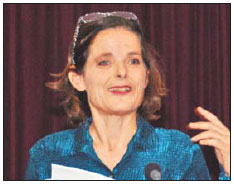Books
Writers share their literary viewpoints
Updated: 2011-01-28 08:05
By Mei Jia (China Daily)
|
French writer Marie Nimier. Provided to China Daily |
Chinese and French writers shared views on their writing and understanding of the two cultures at a Beijing forum on Jan 21 and 22.
The event was organized by the French Embassy, the Chinese Writers' Association (CWA) and the French Institute.
For Chinese-Frenchman Christophe Wang, the forum presented an opportunity to pose a question he has pondered for decades: "As a literature lover living in France, I've noticed most French people have vague ideas about Chinese literature - especially more recent works," Wang said, asking the participants why they believed this was so.
The keynote speeches by Paul de Sinety, with the French Institute, and CWA president Tie Ning addressed the question.
Tie pointed out the two countries share strong economic and cultural ties.
"French literary works have provided constant inspiration for generations of Chinese writers," she said. "We've also seen increasing interest in reading about China among younger French readers."
French writer Marie Nimier counted herself in that crowd because of her interest in Chinese authors' newer works.
The talented writer informed her Chinese peers about the way she viewed these works and said writer Liu Zhenyun's works are similar to Franz Kafka.
Liu incorporated his signature humor when talking about his interpretation of the four Chinese classics in a discussion on "literature and classics".
He called A Dream of the Red Mansions a philosophical book and the first novel to detail everyday life from that time. And, he said, Outlaws of the Marsh should be renamed Tears of the Heroes, because killing is done for the purpose of defending liberty. His witty and accessible introduction of the "four must-reads" won laughter from the French writers.
Li Er, who has abundant international literary exchange experience, likened the situation faced by contemporary Chinese writers to a discussion about the ages of apple trees in Europe and China.
Li said he was amazed to have discovered an apple tree in Switzerland that's 103 years old, while China's development is making it increasingly difficult to find old apple trees.
"Changes - overlapping stages of the planned economy, the market economy and globalization - in the country in recent decades have complicated the so-called Chinese experience," Li said. "Chinese writers are facing difficulties in expressing the 'experience', which is rarely understood by the Western world."
French scholar and writer Philippe Nemo echoed Li's views.
"China's progress shows Confucian culture can go well with Western scientific and technological development," Nemo said.
"Only when the two cultures are ready to engage in more dialogue can the world have a better and more hopeful future."
Writers Jiang Yun, Fang Fang and Annick Geille, and critic Ji Hongzhen, shared their explorations of literature as women writers.
Jiang talked about the motif of family in Chinese literature and her version of the classic tale The White Snake.
Ji reviewed the history of French feminist literature and its influences on Chinese society. Established Chinese writer Fang agreed that Chinese women have achieved progress in gaining social equality and called for more independence in women's writing.
Translations and challenges from the online world were also discussed at the forum. Heated discussions involved writers Zhang Wei, Xu Kun and Guo Xuebo, experts He Xiangyang and Herve Serry, and translators Genevieve Imbot-Bichet and Sylvie Gentil.
Gentil, translator of the works of contemporary Chinese writers Yan Lianke, Mian Mian and Liu Suola, said she's carefully balancing her own tastes with French readers' general interest in Chinese literature, while searching for works to introduce to France.
"The French public would like to read about the traditional side of China, represented by works with rural themes by Mo Yan and Yan Lianke, and new perspectives represented by the works of younger writers born in the 1970s and '80s," she said.
"I know it's not easy to translate contemporary works. I'm making an effort, and I'm not alone."
China Daily
E-paper

Sindberg leaves lasting legacy
China commemorates Danish hero's courage during Nanjing Massacres.
Crystal Clear
No more tears
Road to the Oscars
Specials

NPC & CPPCC sessions
Lawmakers and political advisers gather in Beijing to discuss major issues.

Sentimental journey
Prince William and Kate Middleton returned to the place where they met and fell in love.

Rent your own island
Zhejiang Province charts plans to lease coastal islands for private investments

